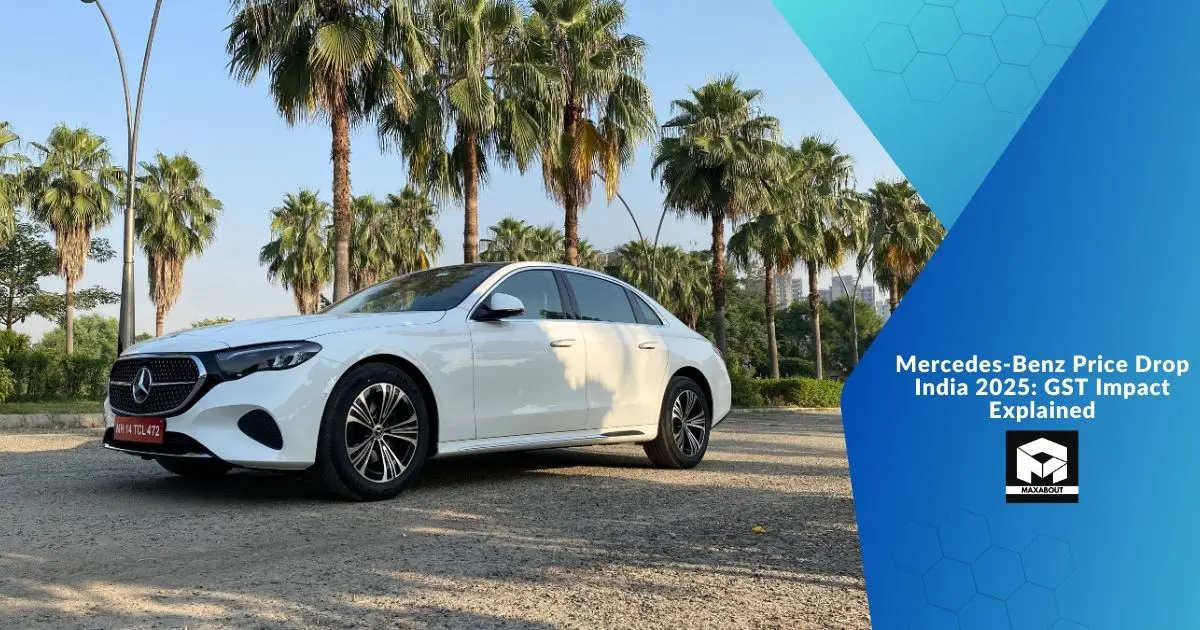Mercedes-Benz Announces Major Price Cuts Following GST Implementation

The luxury automotive segment in India has received a significant boost as Mercedes-Benz, the country's leading luxury car manufacturer, has announced substantial price reductions across its entire product range. These price cuts, ranging from Rs 1.2 lakhs to Rs 11 lakhs, come in response to the tax benefits resulting from the implementation of the Goods and Services Tax (GST) reform.
This development marks a potential turning point for the luxury car market in India, which has historically struggled under high taxation. Based on my analysis of the industry and market trends, this move could stimulate increased demand for premium vehicles while also setting a precedent for other luxury manufacturers to follow suit.
Understanding the GST Impact on Luxury Vehicle Pricing
The GST implementation has rationalized the tax structure for automobiles, particularly benefiting the luxury segment that previously faced multiple taxation layers. Under the old tax regime, luxury vehicles were subject to various taxes including:
- Excise duty (ranging from 27% to 30%)
- State VAT (typically around 12.5% to 14.5%)
- Infrastructure cess (1% to 4%)
- Additional luxury taxes in certain states
The new GST structure has simplified this complex taxation system, replacing multiple taxes with a single tax rate. Luxury vehicles now fall under the 28% GST bracket plus a cess that ranges from 15% to 25% depending on the vehicle type, size, and engine capacity.
The rationalization has effectively reduced the cumulative tax burden on luxury vehicles, allowing manufacturers like Mercedes-Benz to pass these benefits directly to consumers. According to industry experts, the overall tax incidence has decreased by approximately 4-6% for most luxury models.
Mercedes-Benz Model-Specific Price Reductions
The price reductions announced by Mercedes-Benz vary across their model lineup, with larger and more premium vehicles seeing more substantial cuts. Here's a breakdown of the price reductions across various Mercedes-Benz models:
| Model | Previous Ex-Showroom Price (Rs) | New Ex-Showroom Price (Rs) | Price Reduction (Rs) | Percentage Reduction |
|---|---|---|---|---|
| Mercedes-Benz CLA | 33.5 lakhs | 31.4 lakhs | 2.1 lakhs | 6.2% |
| Mercedes-Benz GLA | 34.2 lakhs | 32.3 lakhs | 1.9 lakhs | 5.5% |
| Mercedes-Benz C-Class | 42.8 lakhs | 40.2 lakhs | 2.6 lakhs | 6.0% |
| Mercedes-Benz E-Class | 57.5 lakhs | 53.1 lakhs | 4.4 lakhs | 7.6% |
| Mercedes-Benz GLE SUV | 67.9 lakhs | 64.1 lakhs | 3.8 lakhs | 5.6% |
| Mercedes-Benz GLS | 87.5 lakhs | 82.1 lakhs | 5.4 lakhs | 6.2% |
| Mercedes-Benz S-Class | 1.42 crore | 1.33 crore | 9 lakhs | 6.3% |
| Mercedes-Benz GLS 63 AMG | 1.78 crore | 1.67 crore | 11 lakhs | 6.2% |
The flagship S-Class and performance-oriented AMG models have received the most substantial price cuts, with reductions of up to Rs 11 lakhs on select variants. This strategic pricing adjustment aims to stimulate demand in the higher end of the luxury segment, which has traditionally been more sensitive to taxation changes.
Mercedes-Benz India's Official Statement on Price Reduction

Roland Folger, Managing Director and CEO of Mercedes-Benz India, has issued an official statement regarding the price reduction. According to reports from industry publications, he stated: "We welcome the implementation of the GST in India, which will support the 'One Nation, One Tax' philosophy by creating a unified tax structure across all goods and services. As industry pioneers, we have decided to pass on the GST benefits to our customers with immediate effect."
The company has confirmed that the revised pricing is effective immediately across all authorized Mercedes-Benz dealerships in India. Industry analysts note that Mercedes-Benz is the first luxury automaker to announce such comprehensive price reductions following the GST implementation, potentially setting a precedent for competitors.
Impact on Mercedes-Benz's Market Position in India
Mercedes-Benz has maintained its leadership position in the Indian luxury car market for several consecutive years. Based on industry data and sales reports, the brand sold approximately 15,538 units in the previous fiscal year, capturing around 40% of the luxury vehicle market share in India.
Looking at the competitive landscape, these price reductions could potentially strengthen Mercedes-Benz's market position against key rivals like BMW, Audi, and Jaguar Land Rover. The timing is particularly strategic as it coincides with the typical mid-year sales period when consumer interest tends to increase.
From a market analysis perspective, this price adjustment could help Mercedes-Benz increase its sales volume by an estimated 10-15% in the coming quarters, according to projections from automotive industry analysts. The entry-level models like the CLA and GLA, which now become more accessible, could see the highest percentage growth in terms of sales volume.
Broader Implications for the Luxury Automotive Market in India
The price reduction by Mercedes-Benz signals several important developments for the overall luxury car market in India:
1. Potential Industry-Wide Price Adjustments
Following Mercedes-Benz's announcement, industry observers expect other luxury car manufacturers to announce similar price reductions. Brands like BMW, Audi, Volvo, and Jaguar Land Rover are likely to realign their pricing strategies to remain competitive. According to automotive market analysts, we could see announcements from these manufacturers within the next few weeks.
2. Stimulation of Luxury Car Demand
The luxury car segment in India has historically accounted for less than 2% of the overall automotive market, significantly lower than in more developed economies where this figure ranges from 5-10%. The price reduction could help expand this segment by making luxury vehicles more accessible to the upper-middle-class consumer base.
Market research suggests that there is substantial latent demand for luxury vehicles in India, with many potential buyers deterred primarily by high prices resulting from taxation. The reduced price points could convert a significant portion of these prospects into actual customers.
3. Potential for Increased Localization
With more favorable taxation and potentially higher volumes, luxury manufacturers might be incentivized to increase local manufacturing and assembly operations in India. Mercedes-Benz already has a significant manufacturing facility in Chakan, near Pune, where it produces several models including the C-Class, E-Class, and GLC.
Increased localization could lead to further cost benefits, which might be passed on to consumers in the form of additional price reductions or enhanced feature offerings at the same price points.
Consumer Perspective: Is Now the Right Time to Buy a Mercedes?

For prospective luxury car buyers, this price reduction raises the question of timing their purchase. Based on market trends and economic indicators, there are several factors to consider:
Factors Favoring Immediate Purchase:
- The current price reduction is substantial and directly linked to GST benefits
- Interest rates for auto loans are relatively stable at present
- Mercedes-Benz has been updating its model lineup, offering the latest technologies
- Current models offer improved fuel efficiency and lower running costs compared to older generations
- Additional festive season offers might combine with these reduced prices in the coming months
Considerations for Waiting:
- Other luxury manufacturers might announce more aggressive price cuts to compete
- Mercedes-Benz typically introduces model year updates in the latter part of the calendar year
- Further clarity on the GST implementation might emerge in the coming months
- Year-end discounts might provide additional value
From a value perspective, the current price reduction represents a tangible saving for consumers interested in Mercedes-Benz vehicles. Particularly for higher-end models like the S-Class and AMG variants, the savings of Rs 9-11 lakhs is significant even in the luxury segment context.
Economic Impact of GST on the Broader Automotive Sector
The GST implementation's impact extends beyond just the luxury segment, affecting the entire automotive industry in India, which accounts for approximately 7% of the country's GDP and employs millions directly and indirectly.
For mass-market vehicles, the GST has resulted in more modest price adjustments, with small cars seeing reductions of 2-3% and mid-size vehicles experiencing minimal changes. However, the simplified tax structure has streamlined operations for manufacturers and dealers across all segments.
According to economic analysts, the rationalized tax structure under GST is expected to improve business efficiency, reduce compliance costs, and potentially boost overall automotive sales by 8-10% annually in the medium term. The luxury segment, with its more substantial price adjustments, could see even stronger growth.
Conclusion: A New Chapter for Luxury Cars in India
The price reduction announced by Mercedes-Benz marks a significant milestone in the evolution of India's luxury car market. By passing on the benefits of GST reform directly to consumers, Mercedes-Benz has not only enhanced the value proposition of its vehicles but also potentially expanded the addressable market for premium automobiles in India.
For consumers, this represents an opportunity to access Mercedes-Benz vehicles at more attractive price points. For the industry, it signals a positive shift toward a more rational taxation structure that could support sustainable growth in the premium automotive segment.
As other manufacturers follow suit with their own price adjustments, we can expect increased competition and innovation in the luxury car space, ultimately benefiting consumers through better prices, improved products, and enhanced service offerings.
The coming months will be crucial in determining whether these price adjustments translate into significant volume growth for luxury vehicles in India, potentially reshaping the country's automotive landscape for years to come.

